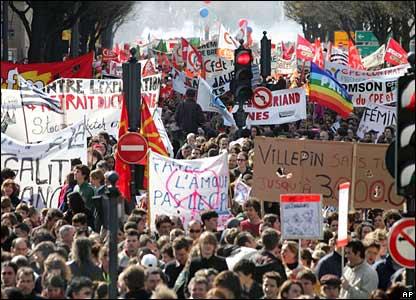French Unions ease tactics in pension reform protest

Protests against Sarkozy's controversial pension reform are winding down this week, despite initial statements from union officials that the resistance would continue. Does this spell defeat for the unions or simply a change of tactics?
On 27 October the French parliament passed the Pension Reform Bill to increase the retirement age from 60 to 62 and the pension age from 65 to 67. The large-scale protests that greeted this reform highlight the intense dissatisfaction with the government and the desire to hold on to a way of life that is under threat from both the ruling UMP and the larger spectre of the EU.
The French social model is viewed by the majority of citizens as fundamental to French life, and attempts at reform in this area have always met with strong resistance from the French people.
However, the fervour which marked earlier strikes seems to be fading. Although yesterday's scheduled protest went ahead, numbers were lower than last week when strikes and blockades threatened to shut down the French economy. It appears the unions are scaling down protests in favour of negotiations with government, and it is possible they will gain some concessions before the bill officially becomes law in a few weeks time.
Much of the media coverage has focused on oil refinery workers, students, and Marseille refuse collectors. The latter are particularly well-known for their radicalism; by the end of a 14-day strike on Wednesday 10,000 tonnes of rubbish had accumulated on the streets of the port city.
Since early September however, other groups have been voicing discontent with Sarkozy's UMP government. Teachers, PSA car factory workers, and railway staff have all staged strikes, truck drivers have carried out go-slow protests and the offices of the UMP and employers' union Medef have been ransacked.
On Wednesday morning a group of around fifty protestors interrupted the live broadcast of a popular radio show on France Inter to read a statement calling for continued resistance and a need to wrest control of the situation from the unions.
Criticising the media, unions, political parties and employers they said: "We must refuse to play a part in the process that is trying to defeat us. We need to decide ourselves how we act and organise, independently from the powers-that-be."
The severity with which the pension reform protests escalated is symptomatic of the tension that has been building in the country for some time. Nicolas Sarkozy remains a deeply unpopular figure, perhaps the most despised President in 50 years.
The French people voiced this contempt at the polls in March when the UMP lost control of all but one area (Alsace) in the country's regional elections. In this way, the protests are about more than the pension reforms. They are about frustration and anger over rising unemployment, the arrogance of the ruling elite - particularly in light of the much publicised Bettencourt Affair - and economic uncertainty. If Sarkozy is to reduce the budget deficit to 3% by 2013 he will need to find 100 billion in savings. The country's current deficit stands at 8% of GDP.
France has incited controversy on the world stage this year. In September the Senate passed a controversial law banning the burqa from public places. At the same time, Sarkozy drew scathing criticism from the European Commission over the expulsion of Roma and dismantling of camps across the country. These events, combined with Sarkozy's refusal to bow to pressure from the street (as so many previous administrations have) calls into question France's esteemed reputation as 'le pays de droits de l'homme'.
But it is unlikely that the French public will completely concede defeat; in 2006 unrelenting protests forced Jacques Chirac to scrap a law creating a new work contract for young people even though the legislation had already been passed by parliament. Although Sarkozy appears to have won the battle, unions will be hoping to extract some significant concessions from government before the bill is signed into law around mid-November.
